
In this guide to gluten-free alcohol, I help you sort the facts from fiction regarding which liquors, beers, wines, and ciders are safe to consume on a gluten-free diet. Please see my disclosures.
People are increasingly eliminating gluten from their diets, whether for medical reasons or experimentation to see if they feel better. This means they’re looking to avoid foods that contain gluten, a sticky protein found in wheat, rye, barley, and sometimes oats.
Not only must these individuals be careful about which foods they eat, but they also must avoid some alcoholic beverages.
In this guide to gluten-free alcohol, I answer 13 of your most pressing questions about alcohol, helping you sort facts from fiction to determine which beverages are safe to drink when following a strict gluten-free diet.
Q1: Is distilled liquor gluten-free?
Technically, all distilled alcohol is gluten-free, even if it’s distilled from a grain that contains gluten. Any alcoholic beverage that is “distilled” is likely free from gluten.
However, it’s important to note that people with gluten disorders are not entirely in the clear when it comes to distilled alcohol. Why? While people with celiac disease react to gluten, people with non-celiac gluten sensitivity, which should be called non-celiac wheat sensitivity, may react to other components of wheat, not just gluten.
In other words, people with non-celiac wheat sensitivity should be cautious about drinking any beverage that contains ingredients derived from wheat. In contrast, people with celiac disease may be fine when drinking a beverage distilled from wheat.
I have celiac disease and have been conditioned to avoid wheat, barley, or rye products. I, therefore, experience a mental block when it comes to drinking these beverages. Instead, I prefer to drink alcohol from brands not derived from a gluten-containing grain.
Whisky, Bourbon, and Scotch
Whiskey is typically distilled from malted barley or rye, bourbon is distilled from wheat, and scotch is distilled from malted barley. While most people with celiac disease will run when they see the words wheat, barley, or rye on a label, these products are distilled and may be safe for you to drink.
Vodka
There are several vodka brands distilled from wheat, including Absolut, Grey Goose, Ketel One, Orloff, and SKYY. They are technically gluten-free, but if you’re avoiding wheat (not just gluten), you may want to consider avoiding them.
There are several vodka brands distilled from corn, grape, rice, or potato, including Tito’s (corn), Ciroc (grape), Smirnoff (corn), Blue Ice (potato), and sometimes Chopin (potato) – look for the black label and GF label. Smirnoff says it’s even distilled from non-GMO corn. Some bottles are labeled “gluten-free.”
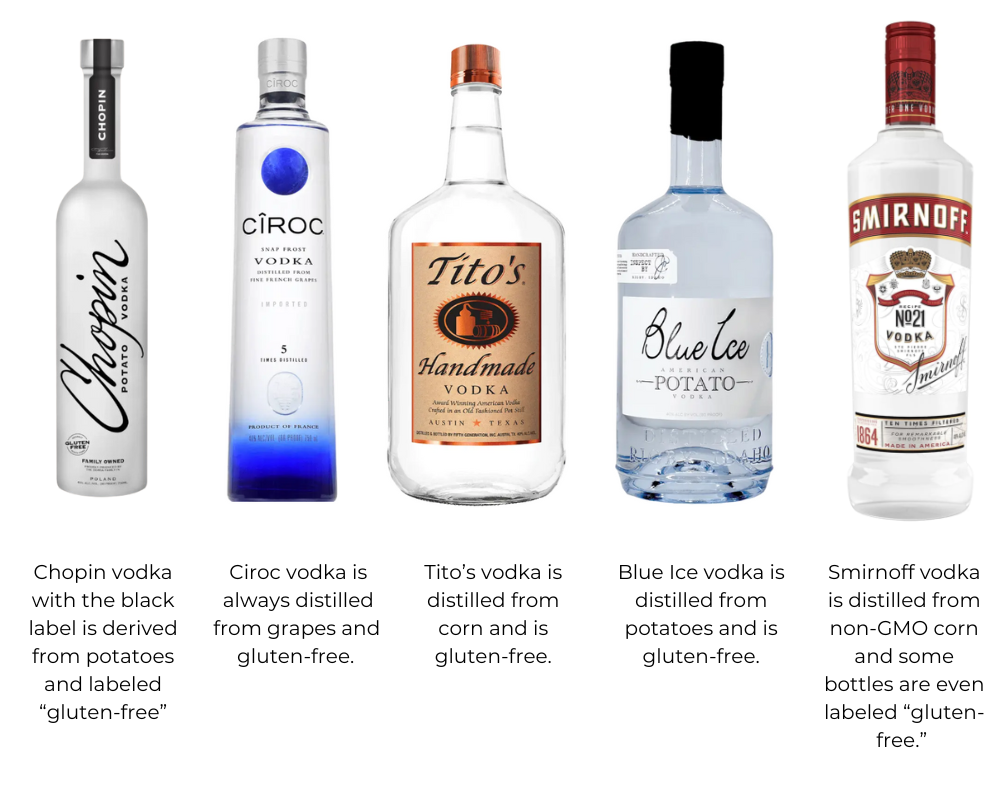
Gin
Gin is distilled from wheat, rye, barley, corn, or potatoes. If distilled, it would be considered gluten-free regardless of the starting grain.
Brands of “gluten-free” gins include Ketel 1, Bluecoat, Tanqueray, Fox & Seeker, Bombay Sapphire, Beefeater, Hendrick’s, Gordon’s, Seagrams, and Manchester Gin.
However, I was not able to determine which brands were distilled from wheat and which from corn. If you have a wheat allergy or non-celiac wheat sensitivity, inquire with each brand to determine its starter grain.
There are, however, a few wheat-free gins that I have been able to confirm, including all of the following, which are all distilled from potatoes:
- Cold River Gin (potato)
- Monopolowa (potato)
- Schramm Gin (potato)
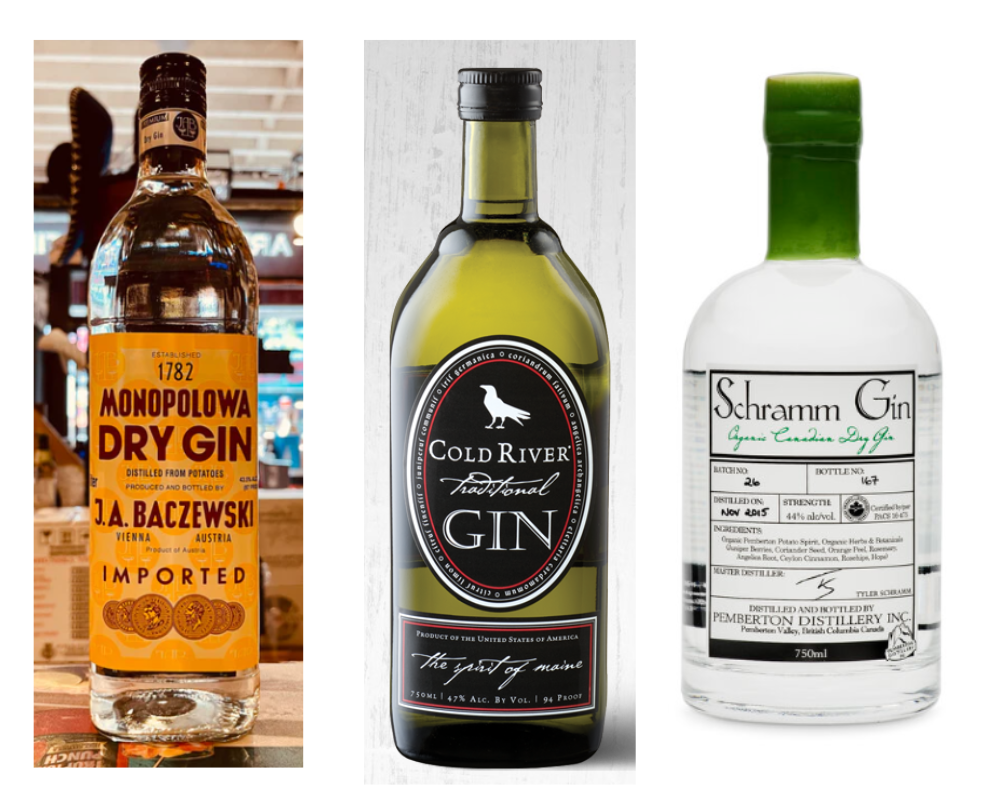
For a more complete list of potato-based gin brands, visit theginisin.com.
Again, distilled alcohol is technically gluten-free but not necessarily wheat-free. Wheat-free liquors may cause a reaction in people with gluten (wheat) sensitivities but may be safe for those with celiac disease.
Q2: What types of liquor are distilled from gluten-free grains?
Several alcoholic beverages that are typically distilled from gluten-free grains include:
Brandy
Brandy is distilled from grapes and fermented fruits and, therefore, typically gluten-free. If there’s added coloring or flavors, it may contain gluten.
Cognac
Cognac is distilled from grapes. Again, avoid cognac with added colorings and flavors.
Rum
Rum is typically derived from cane sugar, although, per usual, watch out for added coloring, spices, and flavors, which may not be gluten-free. RumChata, a popular cream liqueur made from rum, cinnamon, rice, vanilla, sugar, and cream, is also gluten-free, and some bottles are labeled GF.
Tequila
Tequila is naturally gluten-free as it’s distilled from agave. This means you can enjoy those margaritas without worry, my friends!
Avoid distilled beverages if flavorings, such as malt, have been added to the final product.
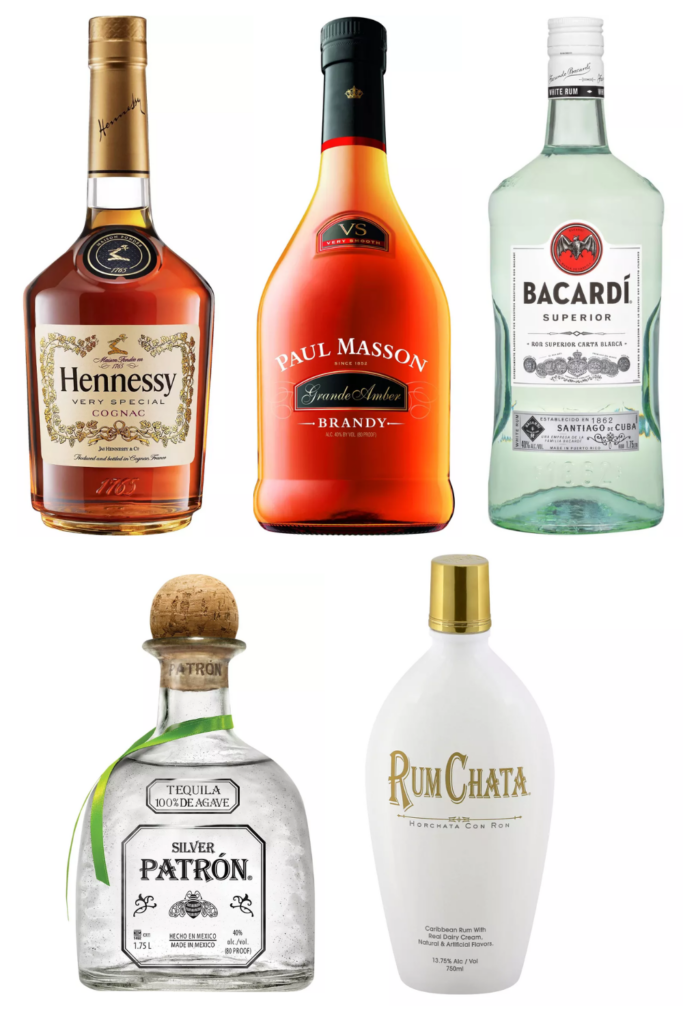
Q3: Is wine gluten-free?
Wine is almost exclusively made from grapes and is naturally gluten-free and safe for anyone on a gluten-free diet.
Oak wine barrels used to age wine may sometimes be sealed with a wheat paste, which could leach into the wine. If it did, it would only add a trace amount, likely below the 20 parts per million (ppm) gluten threshold set by the FDA.
Q4: Is beer gluten-free?
Beer is fermented (vs. distilled) and almost always derived from wheat, rye, barley, or any combination of these grains. Beer is only gluten-free if fermented from gluten-free grains (see below).
Q5: What brands make gluten-free beer?
Several dedicated gluten-free breweries use gluten-free equipment and gluten-free ingredients when brewing their beers.
Holidaily Brewing Company in Golden, Colorado, for example, exclusively uses gluten-free grains, such as buckwheat, millet, and sorghum, to brew its craft beer.
See my comprehensive list of dedicated gluten-free breweries in the U.S. for other gluten-free beer brands.
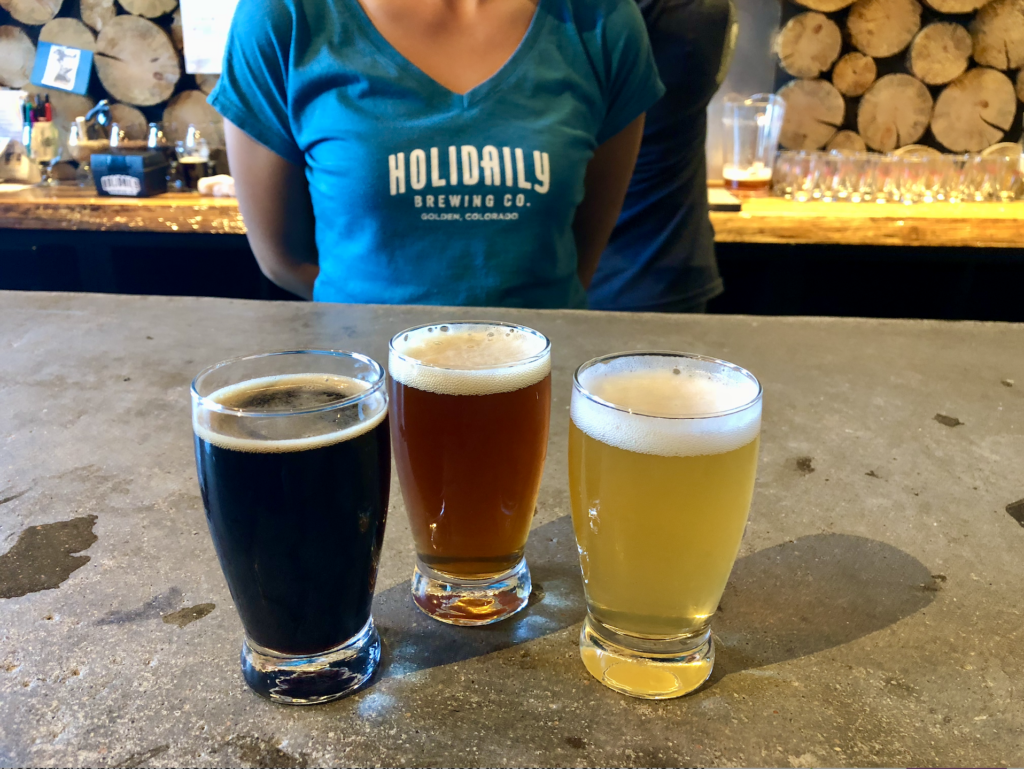
Q6: Are “gluten-removed” beers safe?
Gluten-removed beers, often labeled as “crafted to remove gluten,” are made from barley and other gluten grains. Such beers offer traditional brewers a low-cost way to make and sell beer to the gluten-free community.
Manufacturers of gluten-removed beers use enzymes, such as Clarity Ferm or Brewers Clarex, that promise to break down the gluten protein to the point where it becomes undetectable or significantly reduced in the final product.
However, many experts in the gluten-free community caution anyone with celiac disease or gluten sensitivity from drinking gluten-removed beer for many reasons.
For starters, no validation testing is available to understand if these beverages harm someone with celiac disease, making it difficult to assess whether they’re safe. There is no guarantee that all the gluten has been removed or if it’s been “significantly reduced.”
Further, the Gluten-Free Certification Organization (GFCO) study found that some people with celiac disease react to gluten-removed beer. Why? The GFCO says there may be “residual peptides in the product that may be specifically recognized by persons with celiac disease.”
Currently, experts say persons with celiac disease or gluten sensitivities should avoid gluten-removed beers. Only gluten-free beers brewed using gluten-free grains on dedicated gluten-free equipment are known to be safe for people on a gluten-free diet.
Q7: Is Corona beer gluten-free?
Corona beer is made with barley malt (gluten), non-malted cereals, and hops, according to Corona. However, the Internet is abuzz with rumors that Corona beer is safe because it contains a low level of gluten, potentially under 20 parts per million (ppm). Many say they believe they can tolerate the beer despite its gluten content.
Corona acknowledges on its website that its beer contains “trace” amounts of gluten. People on a gluten-free diet who drink Corona beer are like people who quit smoking but take up low-tar cigarettes. At the end of the day, you’re exposing yourself to gluten; it’s not worth the risk.
Q8: Are hard ciders gluten-free?
Yes, hard ciders are fermented from apples and other fruits or fruit juices and are naturally gluten-free. Always check ingredient labels.
Q9: Are wine coolers gluten-free?
Most wine coolers are made from barley malt (and are “malted”); therefore, they are not gluten-free. Some wine cooler brands tout that they have been crafted to remove gluten, including brands like Mike’s Hard Lemonade and Seagram’s Escapes. Any beverage crafted to remove gluten is unsafe for the gluten-free community until better testing methodology for fermented and hydrolyzed foods becomes available.
Q10: Is sake gluten-free?
According to Beyond Celiac, “premium” sake is gluten-free because it’s fermented from rice. If it’s not labeled “premium” sake, you may need to investigate further with the manufacturer. Non-premium sake sometimes contains additives and flavors and may contain gluten. Beyond Celiac offers a list of gluten-free premium sake brands.
Q11: How is alcohol regulated?
While the FDA regulates gluten food labeling in the U.S., the Alcohol and Tobacco Tax and Trade Bureau (TTB) regulates alcoholic beverages.
The TTB says beverages containing no gluten ingredients can be labeled “gluten-free” if good manufacturing processes are employed to avoid cross-contact with gluten.
The Bureau also says that beverages made with gluten grains where the gluten is removed, such as the cases of gluten-removed beer, must use the words processed, treated, or crafted to remove gluten together with a qualifying statement that informs consumers that the product was fermented or distilled from a gluten-containing grain, that the gluten content of the product cannot be verified, and the product may contain gluten.
Q12: Are Bud Light Spiked Seltzers gluten-free?
Yes, Bud Light Seltzers are gluten-free. They’re made from pure cane sugar, sparkling water, and fruit flavoring.
Q13: Are mojitos gluten-free?
Yes, mojitos are gluten-free. Most mojitos are made from rum, lime juice, and simple syrup. Rum is derived from cane sugar and distilled.
Have More Questions?
If I didn’t answer your question in this gluten-free alcohol guide, please leave a comment and let me know. I will update this content as new information and questions arise. This post was last updated in December 2022.
Love rum? Make my chocolate-covered gluten-free rum balls for New Year’s Eve or other adult parties.
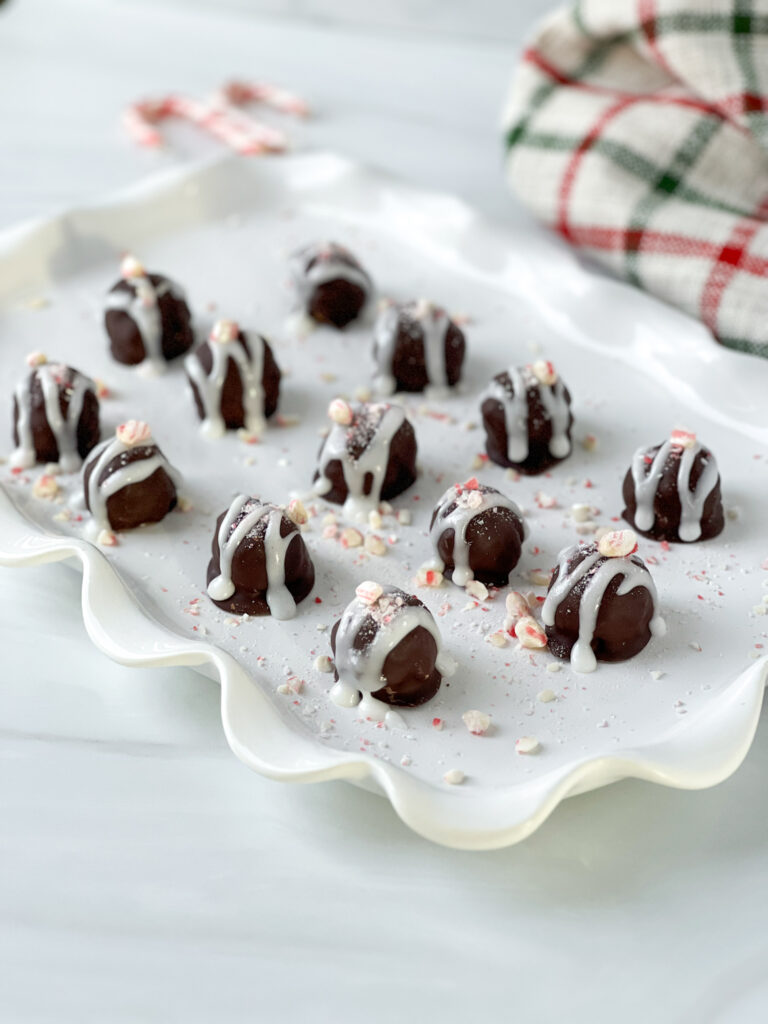
Also, please enjoy the following articles: